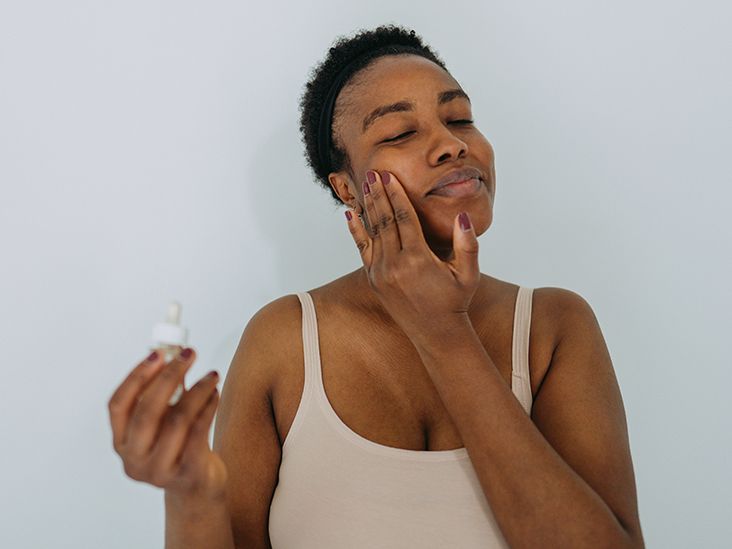African black soap is touted for its many potential healing properties. It may help with breakouts, hyperpigmentation, stretch marks, and more.
African black soap (also called African soap or black soap) is the latest skin care product to reach “holy grail” status, and for good reason.
Unlike the synthetic soaps you find at the drugstore, authentic black soap is handmade from plant-based ingredients in Africa.
If possible, buy fair-trade black soap. Each fair-trade purchase supports sustainable production, and, in some cases, it directly benefits communities in need.
Still not convinced? Read on to learn more about this skincare favorite and how you can add it to your routine.
Natural
In fact, it may actually remove more bacteria than chemical cleansers do. Despite its strength, black soap is gentle enough to use on your:
- face
- hands
- body
If you have dry or sensitive skin, you likely already know that scented soaps and lotions are off-limits. African black soap is naturally fragrance-free — just make sure your chosen product is labeled “unscented.”
People with oily or combination skin are also in the clear. Black soap can help balance your skin’s natural oil production without stripping necessary oils or adding excess oil to your skin.
Shea butter is a crucial ingredient in black soap. While shea can help relieve itchiness and soothe dry skin, cocoa and coconut oil add moisture.
If you have combination skin, black soap makes choosing the right soap that much easier. Shea may add moisture, but coconut oil may help prevent overactive oil glands.
African black soap that contains shea butter
- eczema
- contact dermatitis
- skin allergies
It may even help clear rashes related to eczema and psoriasis. To maximize these benefits, find a soap with oatmeal added.
Black soap is rich in vitamins A and E. These vitamins are both antioxidants, which help combat free radicals and attacks on otherwise healthy skin tissues.
This may be helpful for people who have inflammatory conditions like rosacea.
On that note, black soap may also help treat acne.
In addition to balancing your skin’s natural oils, the soap’s shea content may help repair damaged cells.
Its antimicrobial properties may even clear severe acne.
Shea butter may help reduce signs of ageing. In turn, this can help plump up fine lines and wrinkles. The rough texture of the soap can also exfoliate dead skin cells that make fine lines more noticeable.
Antioxidants found in shea butter can help protect your skin from photoaging. Over time, sun exposure can cause sun spots (age spots), but black soap may offer another barrier.
African black soap is chock-full of natural ingredients, but part of its benefits come from its form.
When left unprocessed, the raw ingredients that make up black soap leave the product far less smooth than the average drugstore soap bar. This makes it a natural exfoliant, which may help improve skin texture.
Exfoliation is another key factor in keeping your skin smooth after:
- shaving
- waxing
- other methods of hair removal
Exfoliating will help remove dead skin cells before they can clog your hair follicles. The moisture in African black soap may also help prevent the lumps and bumps that result from razor burn.
Hyperpigmentation is often caused by acne scarring and sun damage — two things that African black soap may help soothe or prevent.
African Black soap can offer a deeper clean due to its exfoliant properties. This may help ensure you remove all the makeup from your skin. It can provide much-needed moisture after you have cleansed your skin..
Real, unprocessed African black soap has a rough texture. Although the natural texture is ideal for removing dead skin during exfoliation, you’ll want to smooth it out before using it as a regular cleanser.
To do this, simply pull a small chunk of soap off of the bar and rub in between your hands. If you prefer a liquid cleanser, you can dissolve your piece of soap in water before use.
You can apply the bar directly to your skin if you’re looking for exfoliation, but be gentle!
The rough texture is already an exfoliant in itself, so you don’t have to scrub. You may also consider rubbing the bar on a soft washcloth first for gentle cleansing or use on rashes.
With whatever method you choose, make sure that you thoroughly rinse the soap off with lukewarm water after use.
Afterward, apply your favorite moisturizer to your damp skin. This will help lock in the soap’s natural hydrating effects.
Although African black soap can work well for all skin types, using it correctly is key to preventing unnecessary side effects.
Some people find black soap to be drying. You may be able to reduce your risk for this by adding a teaspoon of raw honey to your soap mixture.
If you’re new to raw black soap, consider using it once every couple of days to start. You can gradually increase your use as your skin gets used to the soap.
It’s possible to be allergic to any soap. If your skin becomes irritated or you develop a rash, discontinue use.
Natural black soap is also rough, so it can irritate or even break your skin if you’re not careful. Stinging and burning are also possible.
If you’re using a raw block of soap, use gentle, circular motions as you glide it along your skin.
The best way to prevent skin breakage is to smooth out the soap and combine it with water, or use it with a washcloth.
African black soap is packed with essential nutrients designed to enhance your skin’s natural complexion and help you glow from the inside out. For maximum results, work your way up to using the soap morning and night.
If you begin experiencing any unusual rashes or irritation, discontinue use and see a doctor or dermatologist.
They can help determine what’s causing your symptoms and whether you should permanently stop using black soap.










